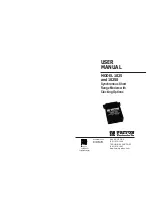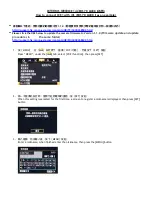
Installation
PSM-500/500L/500LT SCPC Satellite Modem
Page 2-18
PSM-500/500L/500L T- Rev. 0.91
The hybrid “Auto Narrow” and “Auto Track” modes available in previous generations of this
modem are no longer available as separate entries. The “Auto Narrow” function of initially
searching in a smaller acquisition range is incorporated into the latest version of the “Search”
mode. Setting the “Search” mode also enables a new menu item for “Sweep Time”. To be
enabled the
<Dem: IF – Sweep Time>
is set to a value other than 0 Seconds. Then, when a
carrier lock is lost, the modem will search in a reduced acquisition range (equal to the symbol
rate in Hertz) for the specified Sweep Time.
The “Search” acquisition mode also allows a modified version of the previous “Auto Track”
function. When in this mode the modem can be commanded to an offset from the set receive IF
frequency and the modem will begin its narrow search about that offset for the specified Sweep
Time. In this mode the Demod Offset may be set by any command method and the demodulator
will search at that point in the narrow DSP mode. (Note that in the standard fast acquisition mode
the Demod Offset is read only) This mode is intended for possible DAMA use where the offset
can be maintained to insure the fastest lock time.
The acquisition mode is set by setting the
<Demod: IF - Sweep Mode>
option parameter to
either “Fast” (0), or “Search” (1). The “Fast” mode is the standard setting.
2.9.2.1 Initial Acquisition
For initial acquisition, a single setting allows programming the acquisition sweep range that the
modem will search to find an available carrier. This parameter can be set from
±
100 Hz
±
1.25
MHz, where
±
30 kHz is common for standard demodulators. If all of the system offsets are
known and stable for a given installation, the initial acquisition range can be set to a low value
which will slightly reduce acquisition time, especially at low data rates. Conversely if a very
“loose” downconverter is in use such as a block down converter, for example, the initial
acquisition range can be set very wide to allow locking to a carrier well outside the range of
standard modems. Several cautions are in order here. If the acquisition range is set too small and
the system offsets drift, then a carrier may be locked out of acquisition or lost during operation. If
the acquisition range is set too wide and other compatible carriers are within the acquisition
range, then the wrong carrier may be locked.
If a Demodulator Offset frequency parameter is entered in “Search” mode, the Demodulator
carrier frequency setting plus the offset setting is used as the start point for attempting to acquire
a signal. If a sweep time has been set in the “Search” mode the modem uses the last carrier lock
offset as the initial setting.
If the demodulator lock to a signal is forcibly aborted in “Search” mode, the Demodulator will
attempt to acquire another signal immediately higher in frequency than the aborted signal. This
pseudo-sweep always progresses more positive in frequency until it reaches the upper limit of the
set acquisition range, where it will start searching again beginning at the lower limit of the set
acquisition range. This allows a user to “search” through all of the available carriers within the
acquisition range by viewing the
<Dem: Lock – Status>
and pressing the “Edit” or “Enter” key. At
this keypress the modem will prompt with “Enter to unlock”. Pressing “Enter” will cause the
modem to unlock and find the next higher frequency carrier within the acquisition range.
2.9.2.2 Carrier Re-acquisition
For the “Search” acquisition modes the PSM-500 attempts to find a carrier in a reduced or
“narrow” search range for a specified period of time before reverting to the standard search
range. The reduced sweep range is equal to the symbol rate in Hertz. Once the “Search”
acquisition mode is set, the “Sweep Time” Demod parameter setting controls the acquisition
search time in the reduced range.
NOTE: The Narrow sweep range is relative to the receive frequency offset that is commanded via
the remote control or front panel, or the last lock offset.
















































